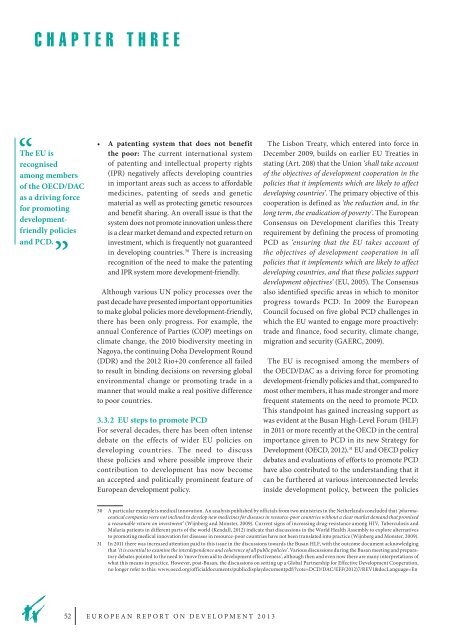Post 2015: Global Action for an Inclusive and Sustainable Future
Post 2015: Global Action for an Inclusive and Sustainable Future
Post 2015: Global Action for an Inclusive and Sustainable Future
You also want an ePaper? Increase the reach of your titles
YUMPU automatically turns print PDFs into web optimized ePapers that Google loves.
CHApTER THREE<br />
The EU is<br />
recognised<br />
among members<br />
of the OECD/DAC<br />
as a driving <strong>for</strong>ce<br />
<strong>for</strong> promoting<br />
developmentfriendly<br />
policies<br />
<strong>an</strong>d PCD.<br />
52<br />
• A patenting system that does not benefit<br />
the poor: the current international system<br />
of patenting <strong>an</strong>d intellectual property rights<br />
(Ipr) negatively affects developing countries<br />
in import<strong>an</strong>t areas such as access to af<strong>for</strong>dable<br />
medicines, patenting of seeds <strong>an</strong>d genetic<br />
material as well as protecting genetic resources<br />
<strong>an</strong>d benefit sharing. <strong>an</strong> overall issue is that the<br />
system does not promote innovation unless there<br />
is a clear market dem<strong>an</strong>d <strong>an</strong>d expected return on<br />
investment, which is frequently not guar<strong>an</strong>teed<br />
in developing countries. 30 there is increasing<br />
recognition of the need to make the patenting<br />
<strong>an</strong>d Ipr system more development-friendly.<br />
although various un policy processes over the<br />
past decade have presented import<strong>an</strong>t opportunities<br />
to make global policies more development-friendly,<br />
there has been only progress. For example, the<br />
<strong>an</strong>nual conference of parties (cop) meetings on<br />
climate ch<strong>an</strong>ge, the 2010 biodiversity meeting in<br />
nagoya, the continuing Doha Development round<br />
(DDr) <strong>an</strong>d the 2012 rio+20 conference all failed<br />
to result in binding decisions on reversing global<br />
environmental ch<strong>an</strong>ge or promoting trade in a<br />
m<strong>an</strong>ner that would make a real positive difference<br />
to poor countries.<br />
3.3.2 EU steps to promote PCD<br />
For several decades, there has been often intense<br />
debate on the effects of wider Eu policies on<br />
developing countries. the need to discuss<br />
these policies <strong>an</strong>d where possible improve their<br />
contribution to development has now become<br />
<strong>an</strong> accepted <strong>an</strong>d politically prominent feature of<br />
Europe<strong>an</strong> development policy.<br />
EuropE<strong>an</strong> rEport on DEvElopmEnt 2013<br />
the lisbon treaty, which entered into <strong>for</strong>ce in<br />
December 2009, builds on earlier Eu treaties in<br />
stating (art. 208) that the union ‘shall take account<br />
of the objectives of development cooperation in the<br />
policies that it implements which are likely to affect<br />
developing countries’. the primary objective of this<br />
cooperation is defined as ‘the reduction <strong>an</strong>d, in the<br />
long term, the eradication of poverty’. the Europe<strong>an</strong><br />
consensus on Development clarifies this treaty<br />
requirement by defining the process of promoting<br />
pcD as ‘ensuring that the EU takes account of<br />
the objectives of development cooperation in all<br />
policies that it implements which are likely to affect<br />
developing countries, <strong>an</strong>d that these policies support<br />
development objectives’ (Eu, 2005). the consensus<br />
also identified specific areas in which to monitor<br />
progress towards pcD. In 2009 the Europe<strong>an</strong><br />
council focused on five global pcD challenges in<br />
which the Eu w<strong>an</strong>ted to engage more proactively:<br />
trade <strong>an</strong>d fin<strong>an</strong>ce, food security, climate ch<strong>an</strong>ge,<br />
migration <strong>an</strong>d security (GaErc, 2009).<br />
the Eu is recognised among the members of<br />
the oEcD/Dac as a driving <strong>for</strong>ce <strong>for</strong> promoting<br />
development-friendly policies <strong>an</strong>d that, compared to<br />
most other members, it has made stronger <strong>an</strong>d more<br />
frequent statements on the need to promote pcD.<br />
this st<strong>an</strong>dpoint has gained increasing support as<br />
was evident at the bus<strong>an</strong> High-level Forum (HlF)<br />
in 2011 or more recently at the oEcD in the central<br />
import<strong>an</strong>ce given to pcD in its new Strategy <strong>for</strong><br />
Development (oEcD, 2012). 31 Eu <strong>an</strong>d oEcD policy<br />
debates <strong>an</strong>d evaluations of ef<strong>for</strong>ts to promote pcD<br />
have also contributed to the underst<strong>an</strong>ding that it<br />
c<strong>an</strong> be furthered at various interconnected levels:<br />
inside development policy, between the policies<br />
30 a particular example is medical innovation. <strong>an</strong> <strong>an</strong>alysis published by officials from two ministries in the netherl<strong>an</strong>ds concluded that ‘pharmaceutical<br />
comp<strong>an</strong>ies were not inclined to develop new medicines <strong>for</strong> diseases in resource-poor countries without a clear market dem<strong>an</strong>d that promised<br />
a reasonable return on investment’ (Wijnberg <strong>an</strong>d monster, 2009). current signs of increasing drug-resist<strong>an</strong>ce among HIv, tuberculosis <strong>an</strong>d<br />
malaria patients in different parts of the world (Kendall, 2012) indicate that discussions in the World Health assembly to explore alternatives<br />
to promoting medical innovation <strong>for</strong> diseases in resource-poor countries have not been tr<strong>an</strong>slated into practice (Wijnberg <strong>an</strong>d monster, 2009).<br />
31 In 2011 there was increased attention paid to this issue in the discussions towards the bus<strong>an</strong> HlF, with the outcome document acknowledging<br />
that ‘it is essential to examine the interdependence <strong>an</strong>d coherence of all public policies’. various discussions during the bus<strong>an</strong> meeting <strong>an</strong>d preparatory<br />
debates pointed to the need to ‘move from aid to development effectiveness’, although then <strong>an</strong>d even now there are m<strong>an</strong>y interpretations of<br />
what this me<strong>an</strong>s in practice. However, post-bus<strong>an</strong>, the discussions on setting up a <strong>Global</strong> partnership <strong>for</strong> Effective Development cooperation,<br />
no longer refer to this: www.oecd.org/officialdocuments/publicdisplaydocumentpdf/?cote=DcD/Dac/EFF(2012)7/rEv1&docl<strong>an</strong>guage=En

















